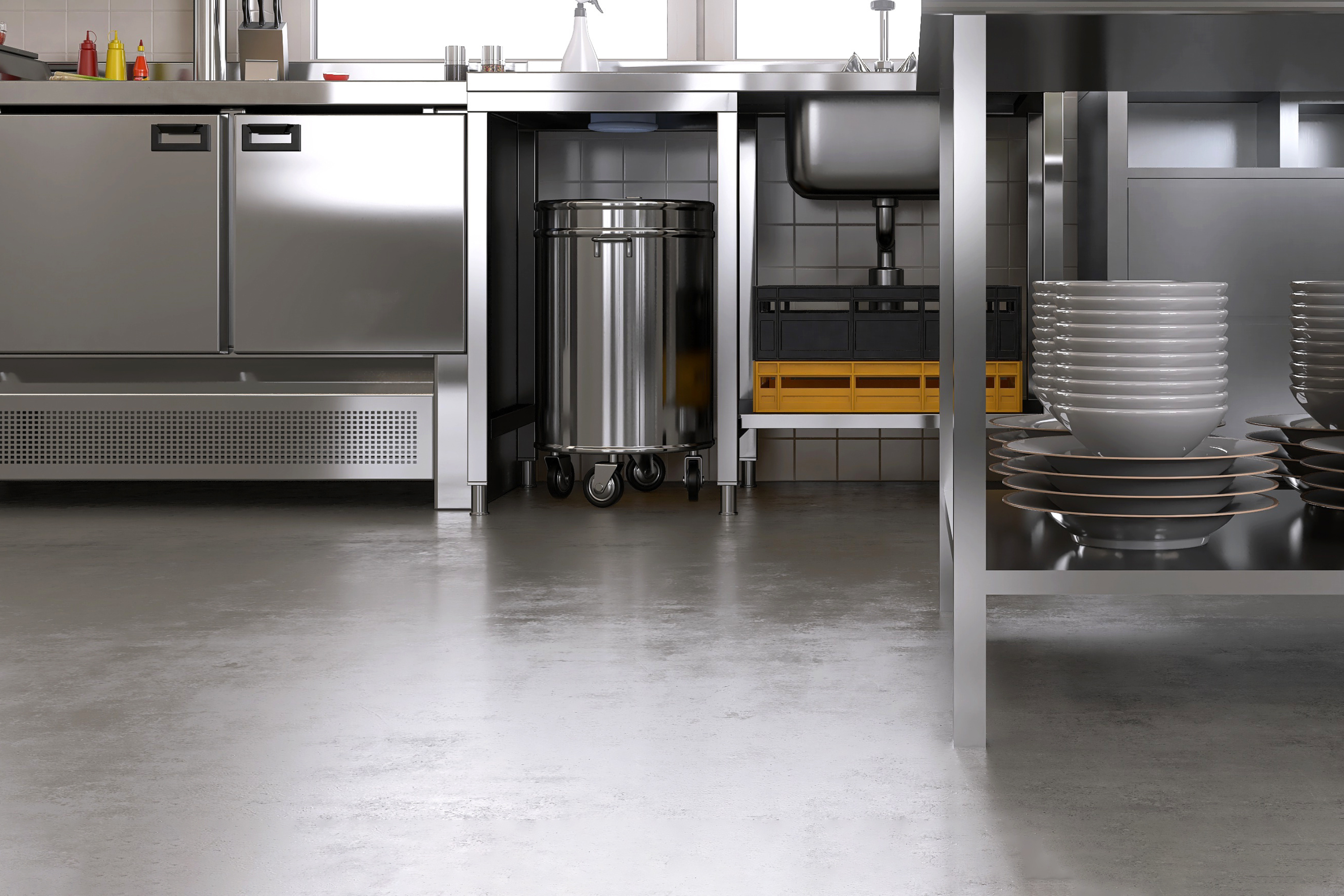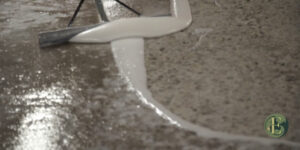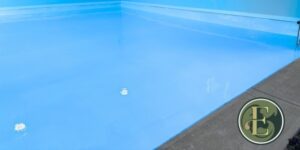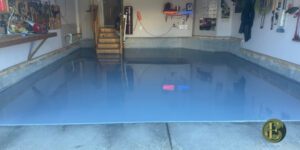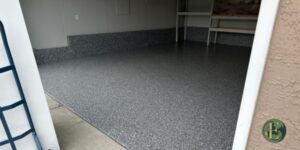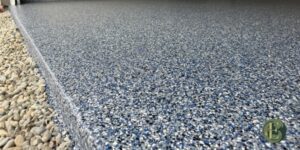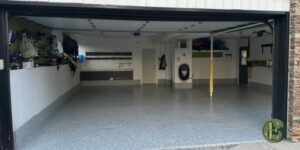In the fast-paced world of Calgary’s restaurant scene, commercial kitchens face a unique set of challenges. From extreme moisture and spills to rigorous cleaning demands, these environments require flooring that not only meets strict hygiene and safety standards but also prevents costly damage.
Elegant Coatings offers high-performance epoxy systems designed specifically for commercial kitchens, providing a seamless, non-porous, chemical-resistant, and slip-resistant solution that addresses some of the most pressing pain points in the industry.
The Challenges of Commercial Kitchen Floorings
Commercial kitchens are environments where speed meets precision under intense pressure. Here are some key challenges that kitchen floors face:
Slip-and-Fall Hazards
Slippery floors pose significant risks in commercial kitchens where spills are frequent. Studies indicate that slips are among the most common causes of accidents in workplaces across Canada. Ensuring slip-resistant surfaces can significantly reduce this risk.
Difficult Cleaning
Cleaning a commercial kitchen floor is no easy task. It requires specialized products that won’t damage the surface while effectively removing grease and grime. The wrong type of flooring can make this process labor-intensive and costly.
Damaged Flooring
Damaged flooring due to moisture exposure or chemical erosion doesn’t just look bad; it also poses serious health risks by harboring bacteria. Repairing or replacing damaged sections often requires shutting down operations temporarily—something no business wants during peak hours.
Business Interruption
Every hour a restaurant closes due to repairs means lost revenue. For businesses operating on thin margins like many restaurants do today, any interruption could have significant financial implications.
Compliance with Health Codes
Health codes in British Columbia are stringent due to the province’s emphasis on food safety. Flooring must be easy to clean and resistant to bacteria growth—requirements that many traditional materials struggle to meet. According to WorkSafeBC data on workplace injuries in British Columbia (including those related to slips), maintaining safe floors is critical for compliance and employee safety. Non-compliance can result in fines or even temporary closure until issues are resolved.
Solutions for Effective Moisture Management
To address these challenges effectively, you need a comprehensive approach focused on durability, hygiene, slip resistance—and most importantly—moisture management:
1. Seamless Flooring Systems:
- These eliminate crevices where dirt accumulates.
- They provide an uninterrupted surface area ideal for thorough cleaning without leaving behind residues that attract pests or harbor bacteria.
2. Non-Porous Surfaces:
- Prevents water penetration into the substrate.
- Reduces risk of mold growth beneath the floor surface—a common issue when water seeps through cracks or pores.
3. Chemical Resistance:
- Essential against harsh detergents used daily.
- Extends lifespan by preventing erosion caused by chemicals commonly found in cleaners used around food preparation areas.
4. Slip Resistance:
- Critical for reducing workplace accidents related to slips on wet surfaces.
- Must meet specific slip rating standards.
5. Rapid Installation & Curing Times:
- Minimizes downtime during renovations or repairs—a vital consideration given tight operational schedules typical in restaurants across Calgary
Here’s how Elegant Coatings’ epoxy systems address each commercial kitchen flooring problems for our clients:
| Kitchen Flooring Problems | Solution |
| Compliance | Seamless & non-porous design ensures easy cleaning & prevents bacterial growth |
| Slip Hazards | Integrated slip-resistant coatings reduce accident risk |
| Difficult Cleaning | Chemical-resistant surfaces withstand harsh cleaners without degradation |
| Damaged Flooring | Durable materials resist wear & tear from heavy foot traffic & equipment impacts |
| Business Interruption | Rapid curing times minimize renovation downtime |
Best Practices for Maintenance of Commercial Kitchen Floors
Maintaining commercial kitchen floors is crucial for ensuring safety, hygiene, and longevity. Here are some best practices to help extend the life of your flooring:
Daily Maintenance
- Sweeping: Begin by sweeping the floor to remove debris and prevent scratches.
- Mopping: Use a neutral cleaner in hot water for mopping. Change the water frequently to avoid spreading dirt around.
- Immediate Spill Cleanup: Clean spills immediately with a soft cloth to prevent stains and slips.
Weekly Deep Cleaning
- Scrubbing: Scrub the floor weekly using a deck brush with a neutral cleaner in hot water.
- Floor Buffering: Use a 175-rpm buffer once or twice weekly (or as needed) with appropriate scrub pads to loosen grease and grime.
Inspection Schedules
- Regularly inspect floors for signs of wear, damage, or moisture accumulation.
- Address any issues promptly before they escalate into costly repairs.
Repair Strategies
- Prompt Repairs: Fix cracks or damaged areas quickly to prevent further deterioration.
- Professional Assistance: Consider hiring professionals if you need advanced cleaning techniques like steam cleaning or degreasing.
Protect Your Investment Today!
Investing wisely in your commercial kitchen flooring isn’t just about aesthetics; it’s about safeguarding your business against costly interruptions while ensuring compliance with strict health codes.
At Elegant Coatings, our mission is not only providing top-notch epoxy solutions tailored specifically towards meeting stringent requirements faced daily within busy kitchens but also empowering owners/managers alike to take proactive steps toward securing long-term success through smart infrastructure choices starting right at ground level – literally!
Contact us today to upgrade your commercial kitchen floorings!
FAQs
- How often should commercial kitchen floors be inspected for damage?
Regular inspections should occur at least quarterly to identify potential issues early, such as cracks or water seepage. This proactive approach helps prevent costly repairs and ensures compliance with health codes.
- Can epoxy flooring be installed over existing surfaces?
Yes, epoxy can often be installed over existing surfaces provided they are properly prepared (e.g., cleaned and sanded). However, it’s crucial to assess the condition of the underlying floor first to ensure a strong bond.
- How does Calgary’s climate affect commercial kitchen flooring maintenance?
Calgary’s humid climate can increase moisture-related issues if not managed properly through regular cleaning and using moisture-resistant materials like epoxy coatings.
- What is the typical lifespan of well-maintained epoxy flooring in a commercial kitchen?
Well-maintained epoxy floors can last up to 10 years or more depending on usage levels and maintenance practices within a busy restaurant environment.
People Also Ask
- What role does ventilation play in preventing moisture buildup on commercial kitchen floors?
Ventilation plays a critical role by reducing ambient humidity levels within kitchens, which helps prevent excessive moisture from accumulating on floors during operations like cooking or cleaning processes.
- Can decorative elements be incorporated into high-performance epoxy systems without compromising functionality?
Yes, decorative elements such as color flakes or metallic pigments can enhance aesthetics while maintaining durability since they are fully integrated into the resin system during application.
- How do local regulations impact choices for commercial kitchen flooring materials in Calgary?
Local regulations emphasize compliance with health codes and safety standards which influence material selection towards options that are easy to clean, resistant to bacteria growth, and provide adequate traction under wet conditions—factors that guide many decisions regarding floor installations across Calgary’s culinary scene today.

